What it's like inside the Great Firewall
« previous post | next post »
By now, we've had dozens of posts about the Great Firewall, VPNs, internet censorship, and so forth, but they're all from the vantage of the outside trying to look in. Of course, that gives us a skewed picture of what the situation is really like with regard to the internet inside and outside of the PRC. This is not a healthy situation, for nearly one fifth of the world's population (17.72%) live inside the borders of China. To be ignorant of how they are living is dangerous, for we may make erroneous assumptions about what one fifth of humanity is doing and thinking.
Fortunately, at last I have found an American expat who has been living and working in the PRC for more than a decade at a remote location and is well connected with many Chinese colleagues. He is an active scholar and very well informed about the internet, AI, databases, and so forth, both inside and outside of the PRC. I should note that he does not live among expats. In fact, he is the only Westerner where he is located, quite far from major metropolitan areas, so he truly understands what Chinese of all walks of life do on a day-to-day basis.
1. Do you use a VPN?
Absolutely. Everyday. My ability to do research would be severely impacted if I couldn’t access databases outside of China and use Google scholar, for example. I also want to keep up on news and culture from western media such as the NYT, Guardian, Economist, NYRB, and of course easily keep in touch with family and friends.
2. How important are VPNs for Chinese and for expats?
I would say for most expats pretty much indispensable. For Chinese, it really depends on the demographic. I asked numerous people on this one just to get a sense anecdotally — I seriously doubt there are dead-on accurate figures — and the replies in numbers never exceeded 1-2% of the entire population, so perhaps 14-28 million people max. That’s still a guess, but at least one based on Chinese friends' and colleagues’ day-to-day experiences. Is a VPN important for Chinese? For academics in the hard sciences much more so, for those in social sciences less, and for those in humanities far less. Some elite universities actually give faculty and students access to VPNs within restricted areas, e.g., on campus, in the library, etc., so a recognition of the importance of accessing information and information flow. In this regard, it’s crucial that universities as institutions with their administrations, like the Chinese government and Party, are not understood as simplistic monoliths with singular voices and views, as I typically see in western media. As for demographics, it also depends generationally: older people I would say very, very little. For the youngest segment, guys in their teens and early twenties definitely more, and specifically for online gaming and other youthful distractions. But the vast majority of Chinese have no need and no interest in using a VPN.
3. Does it matter that Google, FaceBook, Twitter/X, Wikipedia, Wiktionary, etc. are not available in China?
Google a little given the impotence of Baidu, but cn.bing.com is an ok-ish alternative to google. The others definitely not. Facebook and Twitter/X are especially irrelevant to most of the Chinese population. There are quasi-equivalents to Wikipedia on Baidu and other platforms that fulfill a similar need (I can’t speak to quality).
Does it matter…for whom. There’s a massive knowledge asymmetry (akin to information asymmetry) and definitely not in favor of the US. The vast majority of westerners don’t care about what’s going on in China and know very little about the country, but like the rest of the world China has to deal, de facto, with the US and its military-political and cultural power. Cultural power can be attractive, but it need not necessarily be accessed through FB, YouTube or X. People here interact with family friends and colleagues via WeChat and Xiaohongshu (not FB [VHM: it's like Instagram]), they watch Friends on Billibilli and YouTube or TikTok content on Douyin. As for American politics, I live in a very small town and yet I can chat about the American election and politics with a taxi driver. He’ll even know who the US Secretary of State is. I seriously doubt the opposite is true for an equally remote place in the US. What this means is that in spite of any supposed barriers, Chinese know far, far more about the ‘West’ via the internet and apps, never mind via the hundreds and hundreds of thousands of Chinese students studying in North America, Europe, JP, KR, and AUSNZ posting their daily experiences and thoughts on Chinese social media. (Remind me again what the total number of US students studying in China was last year???) This is a serious knowledge imbalance that doesn’t bode well for the US and other countries in the longterm. My sense is that Americans have zero clue about the overall situation and very likely don’t care.
4. Can OpenAI/ChatGPT, etc. gain access to things inside the Great Firewall?
I asked ChatGPT4o about that!
And chatted about transparency… so a little bit about the proprietary “knowledge curation” by companies like OpenAI versus the peer review process in the academic world. And yes, I understand the peer review process is not totally transparent but academics in general tends to be a much more open playing field than a singular corporation.
In the blog you wrote "If China doesn't want its people to know about the world and doesn't want the world to know about what's going inside the Great Firewall I don't think AI Google or any other outside entity should make costly time-consuming efforts to compensate for the willful obscurantism of the CCP/PRC”. According to ChatGPT itself, that’s not what’s going on. It’s not that the Great Firewall/the Chinese government are specifically restricting access to ChatGPT etc., it's governments and companies or “content platforms” worldwide. (The NYT, among a number of other major organizations, is suing ChatGPT for snuffing up its content.) Here’s what ChatGPT4o had to say on the topic — a conversation via a number of screen-grabs gathered as a pdf — where ChatGPT admits that maybe it’s not in the best interest of everyone to let it “scrape” (nice term) content from all and sundry. And what to make of the statistic it gives of less than 0.1%…
5. Which LL post were you referring to that seems to have mentioned the article by Henry Heng LUO (The Hong Kong Polytechnic University) that you felt left much to be desired?
This one that mentioned Luo’s article on Medium, with its poor methodology and remarkably weak understanding of differences in how the internet functions among diverse countries, never mind how people actually use the internet through devices and across apps ("So my friends it’s crucial to be mindful of your online expressions. You never know what kind of unexpected stereotypes may emerge when these powerful language models come into play.” Oi…)
I hope you can bring some attention to the knowledge imbalance aka knowledge asymmetry. This will affect the future far more than the Chinese lack of interest in VPNs or access to western websites. I just came across this interview on VOA that ends on a rather bleak note from David Moser:
David Moser, an American who has lived and worked in China for more than three decades and is the former academic director of China Educational Tours (CET) in Beijing, said that “I haven’t seen an American student in years.”
…
"Asymmetry is bad for China, but it's much worse for the United States because asymmetry is in one direction, which is towards us,” Moser said. “The Chinese have very good knowledge of the U.S., of its culture, of its government, everything."
We need to know how information exchange actually transpires in China, and what the implications of that modus are for Chinese perceptions of what is happening outside of their country. It's not a simple matter of an absolute divide between what is inside the Great Firewall and what is outside the Great Firewall. Although, from the standpoint of the CCP, that would be an ideal situation with regard to knowledge spheres and information flows, it simply is never going to be that way, because China is too inescapably tied into the global politico-economic system, with China leading the way with such grand projects as the Belt and Road Initiative (founded 2013).
There are millions of Chinese living in the United States, some of whom have been living here for a century or more, some more recent immigrants, and hundreds of thousands who come and go as students, workers, tourists, etc. Needless to say, information seeps into China with all of these individuals who come out, communicate with their families and colleagues inside, and often go back to visit or resettle there.
Selected readings
- "China VPN redux (7/17/24) — with extensive bibliography
- "God use VPN" (12/28/15)
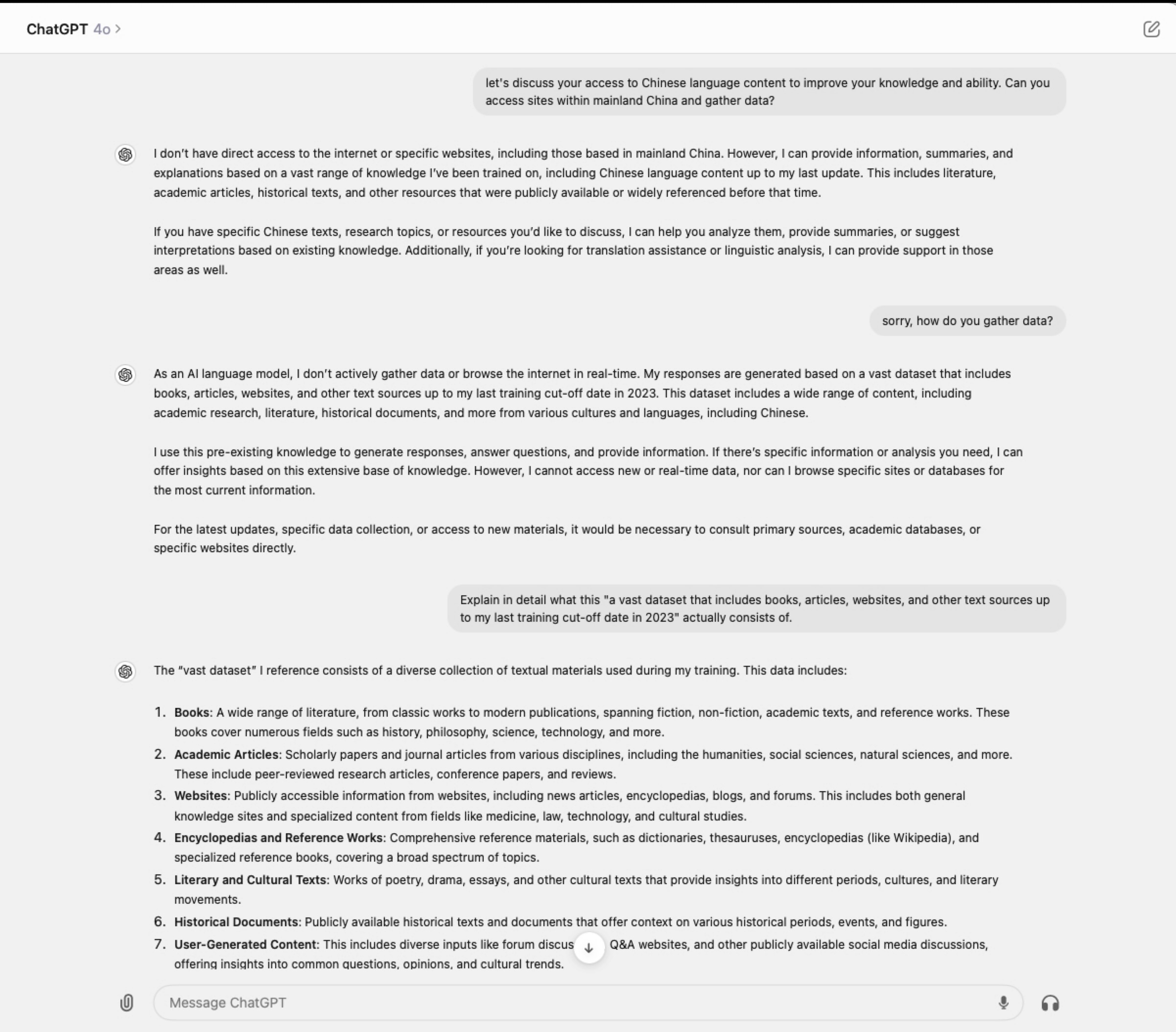
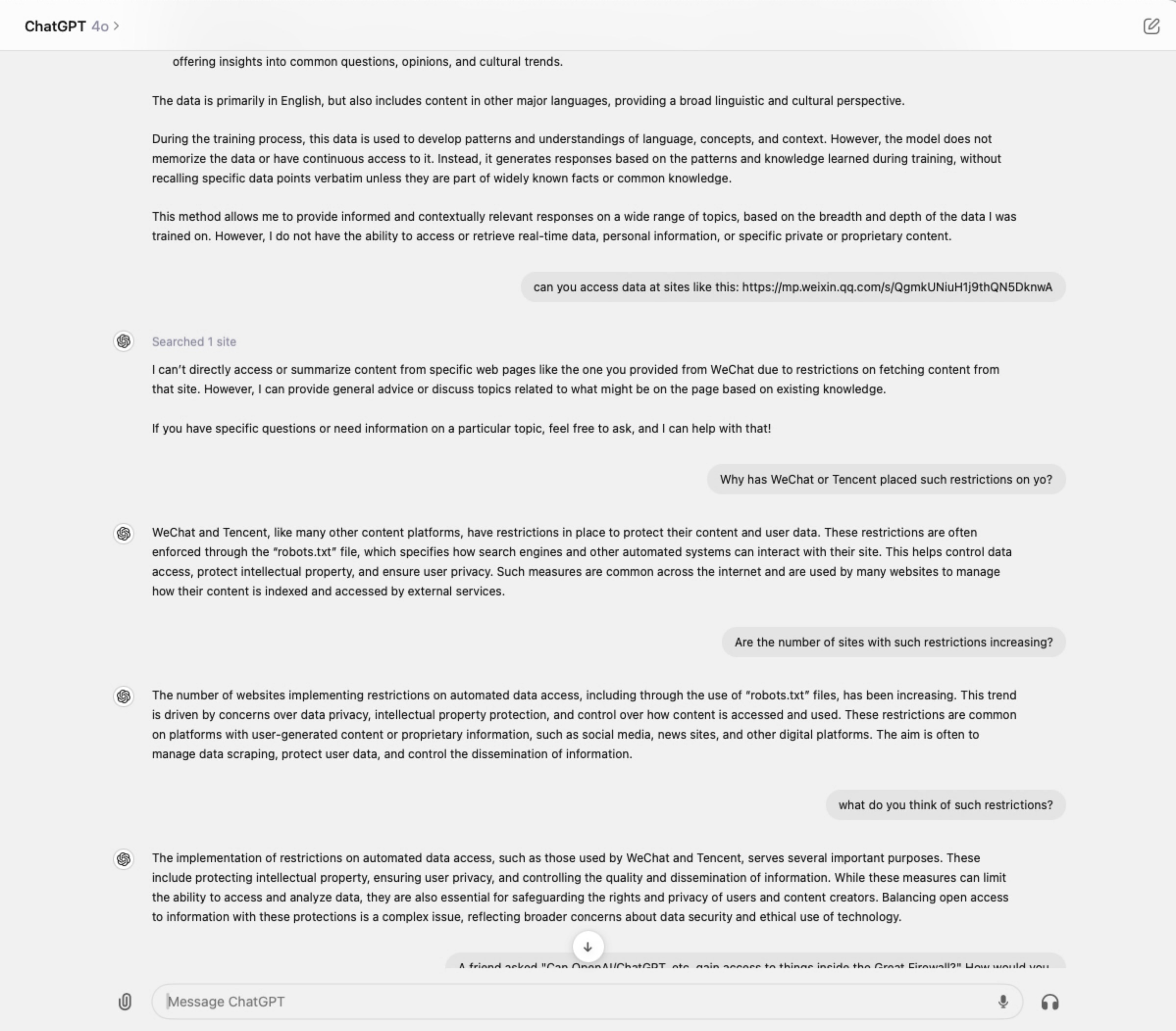
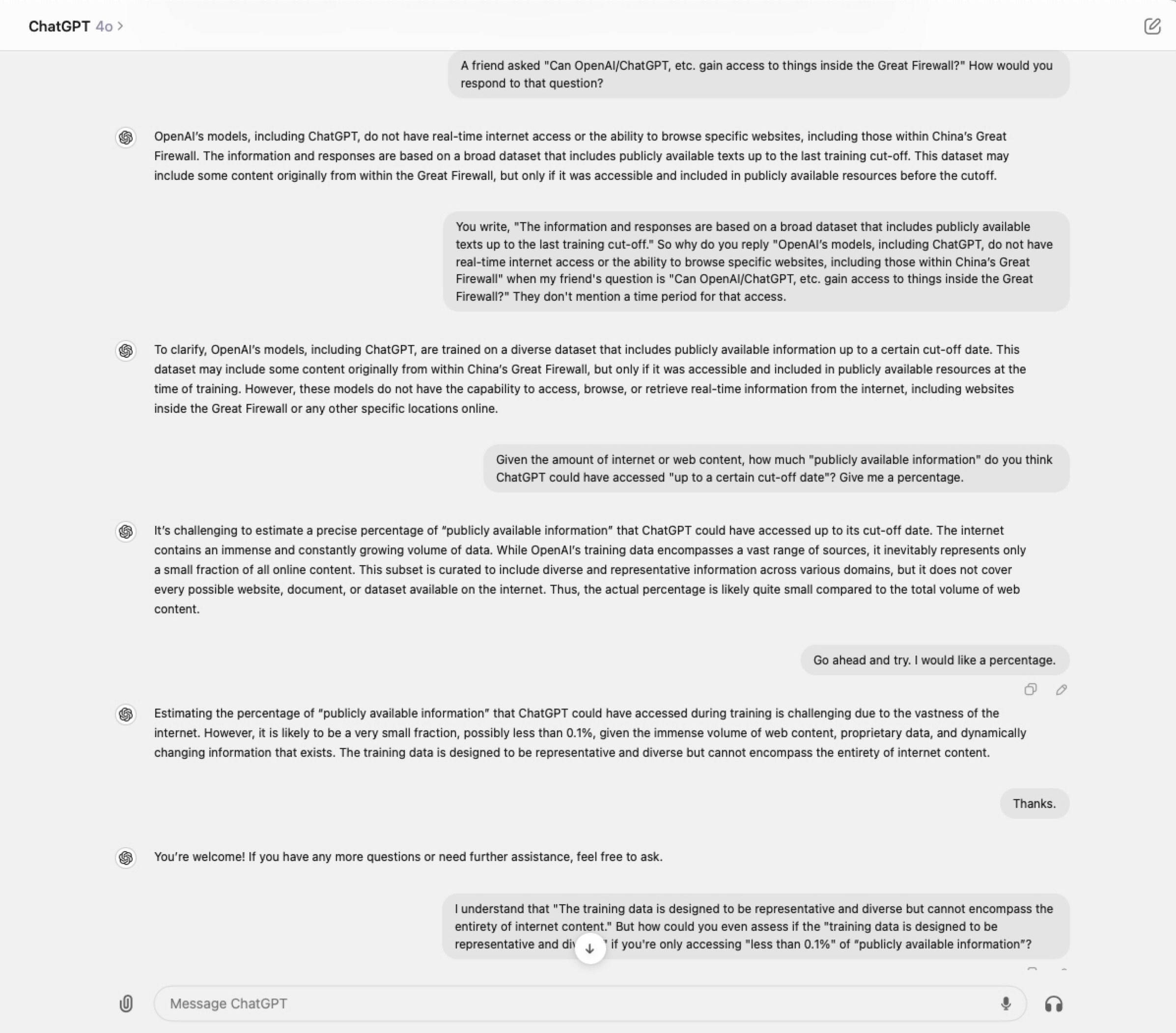
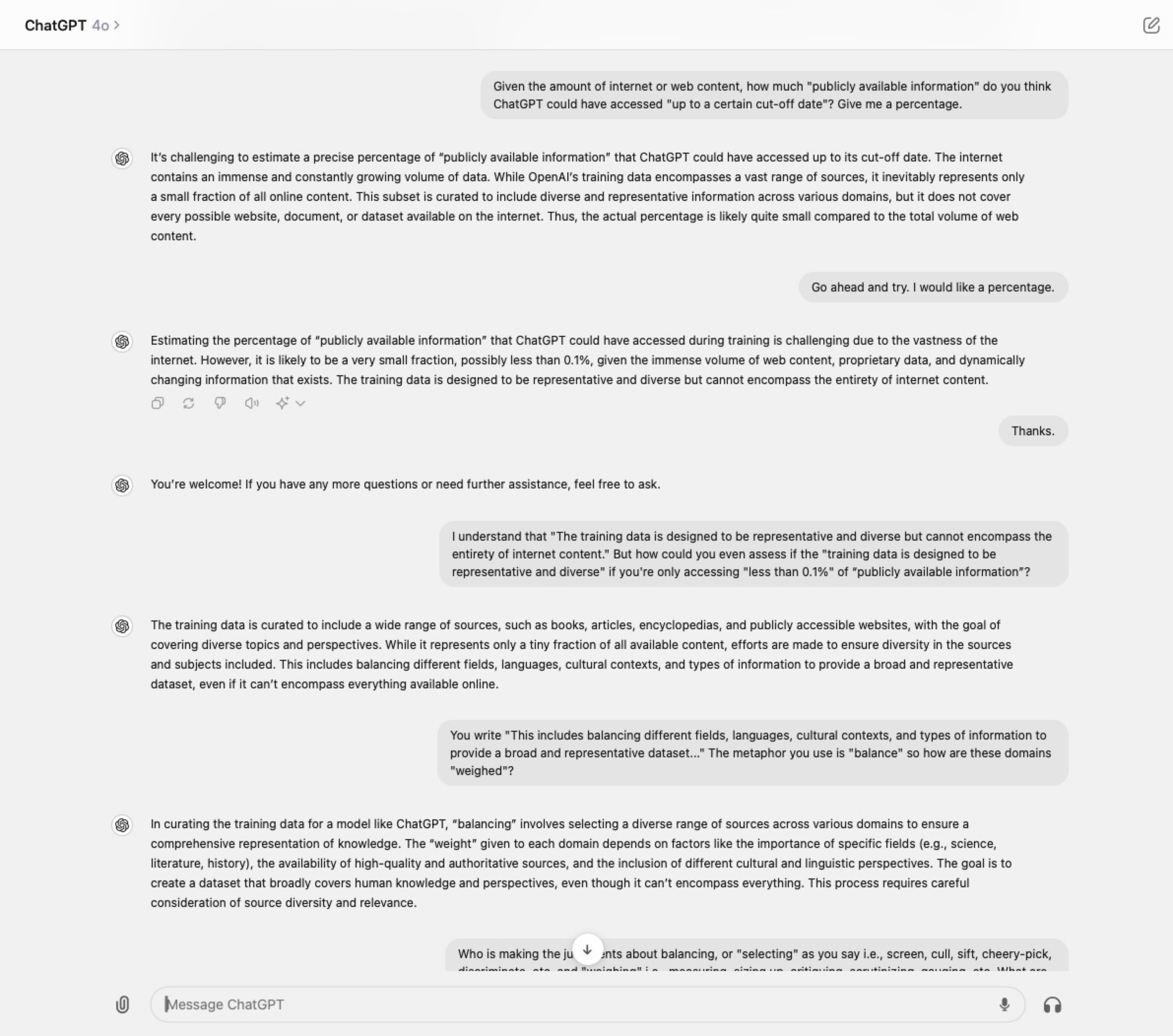
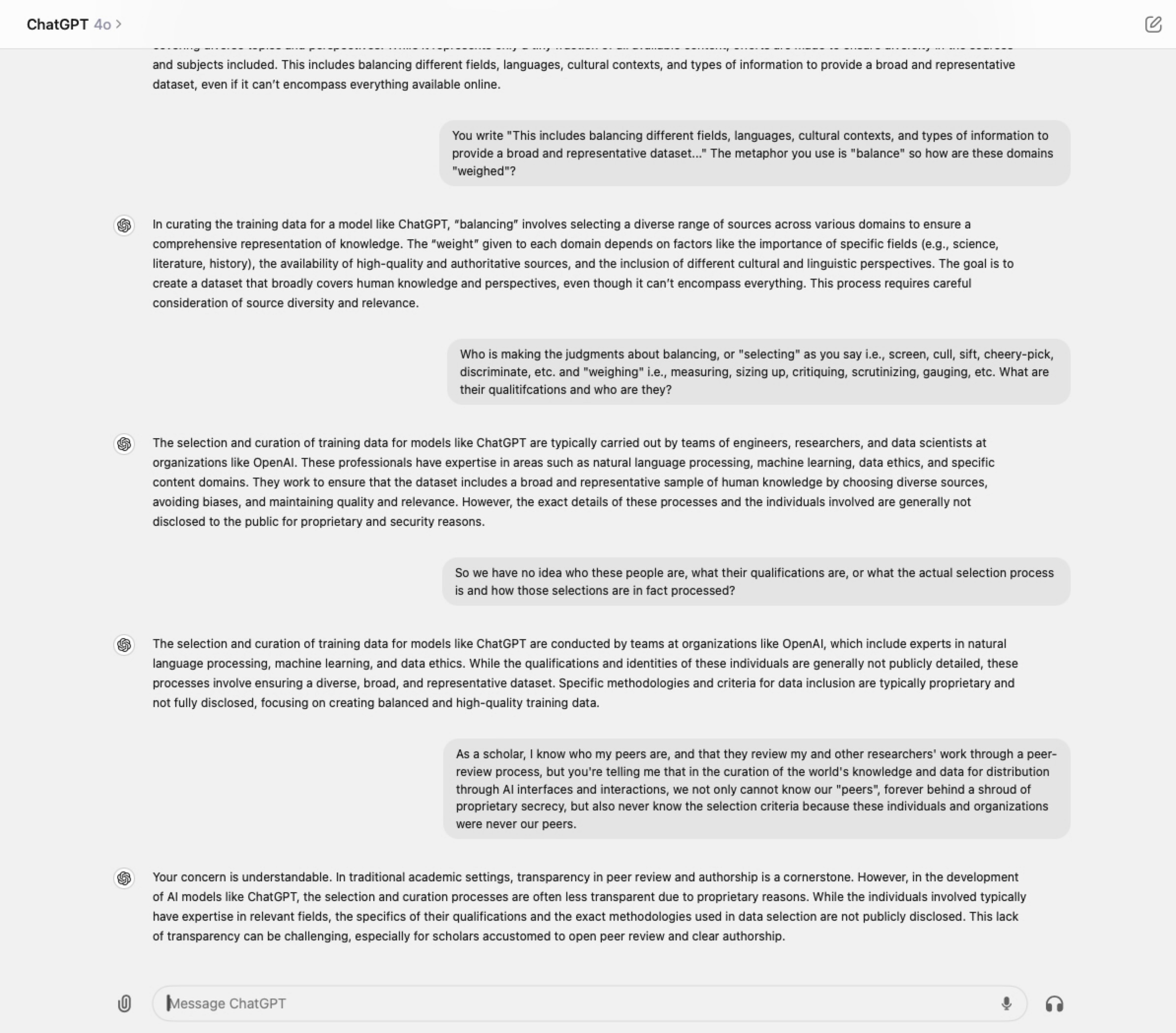
Philip Taylor said,
August 1, 2024 @ 5:33 am
"The NYT […] is suing ChatGPT for snuffing up its content" — here I would have written "snuffling" — might this be an American/British difference ?
AntC said,
August 1, 2024 @ 4:42 pm
@PT, what verb do you use for breathing in a line of coke? Or indeed a pinch of finely-ground tobacco?
Dictionaries exist, you know. I consulted both Wiktionary and my 1970's dead-tree Chambers (which might be more applicable for your idiolect). They agreed:
Wiktionary doesn't note a particularly regional difference. I (a Brit) would use 'snuffling' only for a head cold, not in the sense you suggest. Neither dictionary considers 'snuffle' to have a sense 'ingest through the nose'.
In the case of ChatGPT's shameless plagiarism, I'd use 'snorting'.
Alison said,
August 1, 2024 @ 8:29 pm
I have also experienced this situation of taxi drivers in remote towns having opinions on politics in countries and regions far beyond their own, but this is only surprising if you start with the assumption that taxi drivers must be uneducated. In fact it's a rare profession where workers can spend all day listening to talk radio and chatting with wealthy passengers, absorbing all kinds of information, particularly on current affairs. Given part of the job is to entertain passengers, it should not be unexpected when a taxi driver has something to share that might seem uniquely tailored to the interests of one particular passenger or another.
Case in point: one of the long-standing cliches of foreign reporting in Taiwan is foreign reporters coming to Taiwan and instead of interviewing average people to find the pulse of the nation, they write breathlessly about the deep political conversation they had with their taxi driver. Needless to say, this does not always reflect mainstream opinion or views.
That aside, it is fair to say that people in China tend to know more about American politics than people in America know about Chinese politics, but that is also true for people in many countries outside of America. It's more a commentary on American ignorance than Chinese wisdom.
The other important thing to note is exactly the reason why there is information asymmetry in the first place, and it's that China is an authoritarian nation. In authoritarian nations it is much, much safer to gossip about foreign politics than to take strong stances on or independently reason about local topics. It's not just hard for people outside China to learn about the machinations of Chinese politics, it's opaque for people inside China too – by design. This encourages politically-interested people to engage their hobby by speculating on events overseas instead, which (thanks to the Great Firewall) can also be presented to local people in ways that are favorable to and reinforce the party line.
Meanwhile if people augment the official news with backchannel information from wealthy college students and highly-educated professionals living overseas, then that's also a fairly narrow and elitist perspective on what is happening elsewhere in the world, and not necessarily representative.
I am not sure what the solution to this is, other than to promote freedom of movement and a free press, two rights that most people in China – in particular the poor and less politically-connected – do not enjoy, but which allow people to explore the world and discuss their experiences openly and without fear of retribution. What concerns me more is recent political movements in "free" countries following the Chinese government's path in trying to restrict migration, ban books, discredit independent media and so forth. I fear this will ultimately lead to less informed societies and perhaps less overall understanding of and empathy for other humans around the world.
Philip Taylor said,
August 2, 2024 @ 5:01 am
AntC — "what verb do you use for breathing in a line of coke? Or indeed a pinch of finely-ground tobacco ?" — no idea: I have never considered doing either. As to dictionaries, only the OED (second edition) will be considered, where I find (amongst other, less relevant, possible meanings) —
Philip Taylor said,
August 2, 2024 @ 5:03 am
Gentle reader, please unindent (by two levels) the final para. in the immediately preceding. Taylor, take 20 lines : "I must always check that my <blockquote>s are properly closed before pressing 'Submit'.".
Phil H said,
August 3, 2024 @ 10:21 am
This all seems very accurate to me (Brit living in China). To boil it down to brass tacks:
The Great Firewall works. But it doesn't work by *preventing Chinese people from knowing about the west*. It works by creating a barrier, and then within that barrier constructing whole universes of discourse that are not even talking about the same questions as westerners talk about.
Jacob Matsumoto said,
August 3, 2024 @ 11:00 am
Another important difference between the Chinese and Western internet experiences is that the average modern Chinese person interacts with the internet almost entirely through apps inside WeChat and related social media apps. If they want information on ticket prices at a tourist location they might go see if anyone is streaming from that location and ask the person on the stream, before thinking to look at any official website. One time I opened the internet browser on my Chinese mother-in-law’s phone and she said she’d never seen that app before.
Tom said,
August 11, 2024 @ 11:22 pm
I don't understand the appeal of Friends, but when I was in Qufu in 2012, the staff in the hostel I was staying in spent their down time watching friends. They had a thick booklet of English transcripts of the entire series. Maybe the appeal is simply chance–the first show for which the entire series was available in video and script form. Maybe it's relatability–I know several people from East Asia who don't understand the humor in Seinfeld.